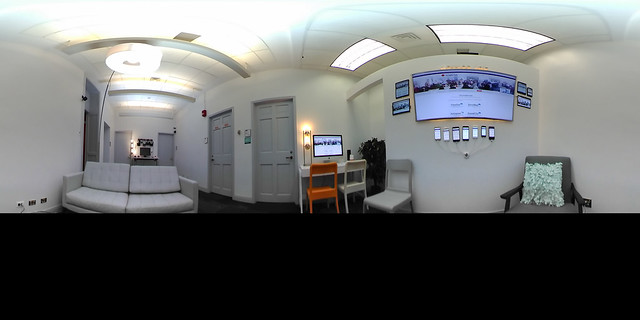The Northwestern Knight Lab has recently opened a new space on campus dubbed The Device Lab. Located on the first floor of Fisk Hall, the Lab is a playground for anyone at Northwestern interested in experiencing and experimenting with the new technologies now available that are actively shaping the future of storytelling. More than that, it also offers a communal space for those interested in technology or journalism to congregate and learn from each other within the worlds of tech and media.
Visit the Lab
The Device Lab will host an upcoming series of free events – the “What the Heck is …? Series – where anyone in the Northwestern community can come and have the chance to try the new technologies at the Lab and be part of a conversation about the cultural implications they may have. Upcoming events include:
- Tuesday, January 17 - What the Heck is VR? Strap on a headset and see what all the buzz is about, and then stick around for a conversation about how VR is changing the ways we interact with computers and consume media.
- Wednesday, February 1 - What the Heck is Alexa? Why Apple, Google, Microsoft and Amazon (among others) are obsessed with voice control, and what that means for user interfaces of the future.
- Wednesday, February 15 - What the Heck is Podcasting? Podcasting is gradually finding its way to the mainstream, but still has a way to go. We'll talk about the challenges of finding what to listen to and about what it takes to make your own podcast.
- Tuesday February 28 - What the Heck are Bots? Instead of R2D2 and BB-8, most of the bots people talk about these days don't have a body. Come "talk" to some "intelligent agents" and discuss what their value might be.
Check it out
The first round of equipment available for use includes:
- Mobile Devices – the display setup on the west wall of the Lab can instantly show the same website on a range of phones, tablets and devices so you can see how users of each device will see that site.
- Virtual and Augmented Reality – the Lab maintains a collection of the latest headsets for both VR (Virtual Reality) and AR (Augmented Reality).
- Living Room – includes devices one might have in their living room such as the Sony PlayStation 4, XBOX One, and the Apple, Android, and Amazon Fire TV devices.
- Voice Interaction – includes voice-activated devices such as the Amazon Echo and Microsoft Cortana.
- Physical Prototyping – includes devices to enable quick prototyping, such as 3D printers and assorted Arduino, Raspberry Pi, and circuit building kits.
- Media Production – includes innovated recording devices like the GoPro Omni (VR system), Samsung 360 Camera gear, and 3D scanners.
In addition, the Device Lab is also home to a dedicated podcast studio and drones which are available to reserve. See the official page on the Knight Lab site for the full list and details.
How it came about
Funding for the lab was provided through Professor Owen Youngman, Knight Chair in Digital Media Strategy, and through Knight Foundation’s founding grant for the Knight Lab. Due to the rapid change associated with this new world of technology, Prof. Youngman is providing additional funds on a yearly basis to update the devices and technologies as they change and as their capabilities improve.
Prof. Youngman hopes that the Device Lab will “provide students with an opportunity to experiment with new technologies not just in a classroom setting as students, but in a real-world environment as consumers of news and media. It’s important that they learn how users and audiences will interact with the work that they produce in the future."
Michael Martinez, a student fellow at Knight Lab, further explains its benefit: “The lab is primarily a learning environment for beginners, but it’s also empowering the more experienced users to try these new technologies before making a financial commitment by purchasing one. For students in particular, the benefit the Device Lab provides is the ability to prototype pioneering applications that are too expensive to independently develop in an effective way.”

